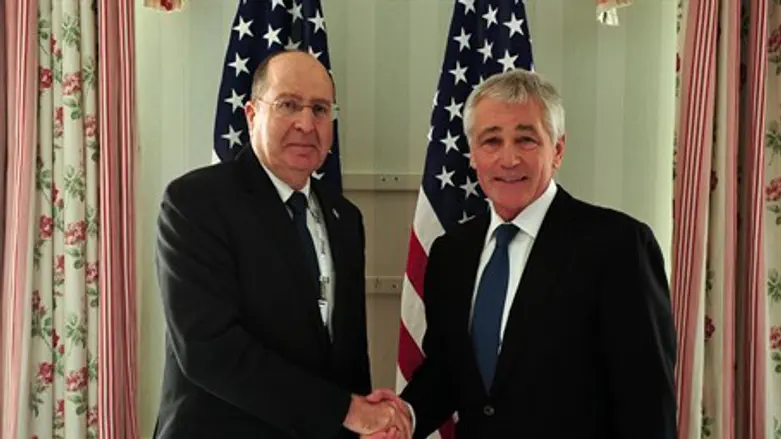
Defense Minister Moshe Ya'alon (Likud) said Tuesday he shared with his US counterpart his country's concerns about the
direction of talks between world powers and Iran on its nuclear program.
In an audio message released by Ya'alon's office after his meeting with Chuck Hagel at the Pentagon, Ya'alon said they also talked about the conflicts in Iraq and Syria and the US-Israel defense partnership.
"The Iranian issue indeed worries us," Ya'alon said. "The question of if there will be an agreement and what kind of agreement worries us. I'm talking about that here and behind closed doors we express our concerns."
Talks between Iran and world powers are to be held in Vienna on Wednesday and Thursday, according to an Iranian official. Iran and the P5+1 group of nations - Britain, China, France, Russia and the United States plus Germany - are seeking a comprehensive agreement over Tehran's nuclear program by a November 24 deadline.
But the talks have been hit by disputes over what limits should be placed on Iran's atomic activities, particularly its enrichment of uranium, and on the process of lifting US, UN and European sanctions.
"We've said all along that better no agreement than a bad agreement, and the question is what are they discussing at the moment, are they talking about how many centrifuges there will be and if so, why should they have centrifuges at all?" Ya'alon said.
"Are they talking about other elements of the Iranian military nuclear project such as missiles ready for nuclear warheads?" he added.
In an October 1 meeting at the White House, Prime Minister Binyamin Netanyahu warned US President Barack Obama not to accept any Iran deal that would allow Tehran to become a "threshold nuclear power."
The same week in New York, Netanyahu warned the UN that Iran was trying to "bamboozle" the world into sealing a nuclear deal that would leave Tehran with the capacity of thousands of centrifuges to enrich uranium.
The nuclear threshold is the point at which a nation is considered to have the radioactive material, equipment and know-how to quickly produce a nuclear device, but has not yet taken the decision to do so.
AFP contributed to this report.
